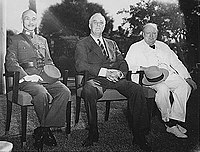1943 Cairo Declaration

The Cairo Declaration was the outcome of the Cairo Conference in Cairo, Egypt, on November 27, 1943. President Franklin Roosevelt of the United States, Prime Minister Winston Churchill of the United Kingdom, and Generalissimo Chiang Kai-shek of the Republic of China were present. The declaration developed ideas from the 1941 Atlantic Charter, which was issued by the Allies of World War II to set goals for the post-war order. The Cairo Communiqué was broadcast through radio on December 1, 1943.[1] The Cairo Declaration is cited in Clause Eight (8) of the Potsdam Declaration, which is referred by the Japanese Instrument of Surrender.
Summary
The main points of the document were:
- The Allies are not fighting Japan for their own territorial expansion.
- The Allies are resolved to bring unrelenting military pressure against Japan until it agrees to unconditional surrender.
- Japan shall be stripped of all islands she has seized or occupied in the Pacific since the beginning of World War I in 1914.
- All the territories Japan has stolen from China such as Manchuria (Dongbei), Formosa (Taiwan), and the Pescadores (Penghu), shall be restored to the Republic of China.
- The Allies are determined that Korea shall become free and independent.
- Japan will also be expelled from all other territories which she has taken by violence and greed.
Legal Effect
The Cairo Declaration was a statement of intention. The Allies, however, did not recognize that the Cairo Declaration itself affected any transfer of Taiwan's sovereignty to China.[2][3]
See also
- Cairo Conference
- Second Sino-Japanese War (1937–1945)
- Potsdam Declaration (July 1945)
- General Order No. 1 (Aug. 1945)
- Japanese Instrument of Surrender (Sep. 1945)
- Treaty of San Francisco (1951)
- Treaty of Taipei (1952)
References
- ^ "Cairo Communiquè, December 1, 1943". Japan National Diet Library. December 1, 1943.
- ^ "Foreign Relations of the United States". US Dept. of State. Jan. 6, 1951. Retrieved 2012-06-07.
The Cairo declaration manifested our intention. It did not itself constitute a cession of territory.
{{cite web}}: Check date values in:|date=(help) - ^ "UK Parliament". Hansard. Feb 7, 1955. Retrieved 2012-06-07.
The position in law is that an armistice or the cessation of fighting does not affect sovereignty.
External links
- Text of the Constitution and Other Important Documents in the Japanese National Diet Library
- The Cairo Conference, 1943
